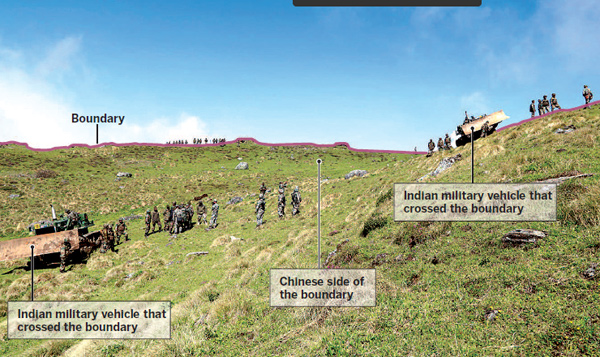Geostrategic miscalculations are behind India's border trespassing

A Foreign Ministry photo released on Wednesday shows Indian troops encroaching on Chinese territory. Provided to China Daily
The tensions caused by India's troops trespassing across the Sikkim section of the China-India border into Chinese territory show no signs of abating. This incident has brought back memories of colonial-era history and triggered fresh worries about a looming contest of will between the two giant Asian neighbors.
For China, the trespassing by Indian troops was unexpected and it is unacceptable as it happened in a section of the boundary that has hitherto been considered beyond dispute by both sides in the otherwise long drawn out and arduous boundary negotiations. The Sikkim section of the boundary was established by the 1890 Convention Between China and Great Britain Relating to Tibet and Sikkim, which was signed between Britain, the then colonial ruler of India, and China's Qing Dynasty (1644-1911). The Convention clearly marks Donglang as Chinese territory.
As is the norm under international law, the People's Republic of China inherited the boundary line between Donglang and Sikkim. On its part, India accepted the boundary as shown in letters from prime minister Jawaharlal Nehru to Chinese premier Zhou Enlai and through diplomatic notes and documents.
For 127 years, each side has exercised jurisdiction over its side of the boundary as delimited by the 1890 Convention without any dispute over the specific alignment of the boundary. These facts are clearly recounted in a recently published position paper by the Chinese Foreign Ministry.
The assertion by India that the 1890 Convention merely provides a basis for delimiting the boundary between the two countries is totally untenable. As the Chinese position paper makes clear, once a boundary is established by a convention, it is under the protection of international law and shall not be violated.
India's trespassing amounts to no less than a violation of China's territorial sovereignty, and China has the lawful right to take whatever measures it deems necessary to defend its territory.
India's initial lame argument was soon followed by another, as it claimed that its action was requested by Bhutan, which wanted India's help in defending its territory against China. Yet there has been no Bhutanese statement suggesting this was the case or even that it had prior knowledge of India's intent to trespass. This was borne out by the fact that Indian border troops crossed into China from the Indian side of the boundary in the Sikkim sector rather than from Bhutan.
Bhutan's frustration is well-captured by a recent blog by a wellknown Bhutanese commentator, who worried that India was getting Bhutan to claim territories that India itself had no right to claim.
Bhutan has had to follow Indian guidance in its external relations since 1949. Although a new treaty signed with India in 2007 nominally established equal relations between the two, Bhutan is not really free of India's interference in its external affairs. Using Bhutan as a cover for its trespassing only reveals India's true colors as a regional bully.
India's real motive is to make Donglang a disputed area. Donglang lies just dozens of miles away from the Siliguri Corridor, a narrow stretch of land known as the "Chick-en's Neck", which provides vital passage between India's northeastern states and the rest of the country. China's road construction in Donglang is seen by some Indian conspiracy theorists as an attempt to gain the capability to cut the Chicken's Neck.
Such zero-sum thinking has very much colored India's recent perceptions of China. Of late, it has harbored deep grievances at what it perceives to be China's obstructing of its ambitions to be a member of the Nuclear Suppliers Group and on the UN Security Council. And the fast progress China and Pakistan have made in advancing their economic corridor is a thorn in its side.
While misunderstandings between neighbors are understandable, India should engage in candid dialogue, not lawless provocations.
Defying an established boundary carries serious risks for India. If a clear boundary line bound by a legal instrument can be reneged on or tampered with, what about the hundreds of square kilometers of Tibetan territory that was lost to British Sikkim as a result of the 1890 Convention? If the boundary between Sikkim and China is no longer recognized as one between India and China, what would the status of Sikkim be? Furthermore, if India bends its border treaties at will, how can its neighbors be assured that their borders can be protected by international law and basic norms governing international relations?
When there are any bilateral differences, China's preferred approach is consultations to find a peaceful resolution. Yet it would be a grave mistake for India to take China's goodwill as a sign of weakness. China's resolve to defend its territorial sovereignty is unshakable. Time is fast running short for India to pull out from Chinese territory and on that basis explore a face-saving solution in consultation with China. India should do well to remember that its neighbor has the capability to "defeat all invading enemies".
The author is a Beijing-based researcher on international studies.






